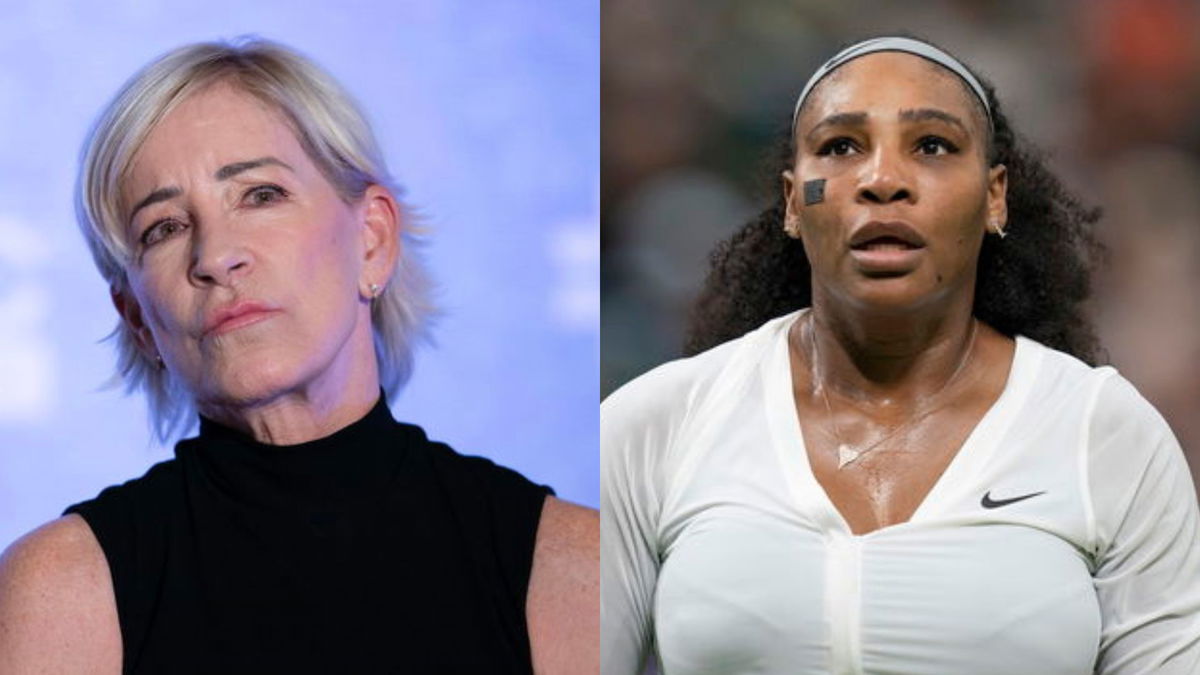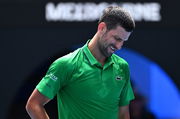
Imago
Image credit: imago

Imago
Image credit: imago
Remember when Serena Williams made that thunderous call to walk away with 23 Grand Slam titles in her vault? Just one short of the mythical 24 held by Margaret Court, yet her greatness needs no asterisk. “With all the respect to Margaret Court, it’s another era,” her coach Patrick Mouratoglou once said, powerfully contrasting legacies across generations. As pressure now shifts onto Novak Djokovic to break records, one prominent American sports journalist and historian has stepped into the fray, championing the modern greats. In this evolving debate of eras, names like Chris Evert and Serena Williams continue to command the loudest respect.
Watch What’s Trending Now!
In a fiery new episode of Bonus Clip, tennis historian Steve Flink joined Gill Gross to dive deep into the legacy-defining stakes surrounding Novak Djokovic’s quest for a 25th Grand Slam title at the upcoming US Open. But while the Serbian legend remains laser-focused on rewriting history, Flink wasn’t shy about calling out an even older record, one that’s long divided the tennis world. “Margaret Court is not even in the conversation for the greatest woman tennis player of all time. Not even close,” Flink declared, kicking off the segment with thunder.
His words echoed louder as the discussion unfolded. With clinical precision, Flink laid out the hard truth behind the numbers. “Every—all the experts would put Martina [Navratilova] and Steffi [Graf] and Serena [Williams], and Chrissy [Evert] ahead of Margaret.” No hesitation. Just a brutal and bold reality check. He then peeled back the layers of Court’s legacy, particularly her dominance in an era where top talent often skipped the Australian Open.
ADVERTISEMENT
Flink didn’t mince words: “The other thing is she won a lot of cheap Australians, and I don’t want to knock her, but there were a lot of those fields that were really quite weak because nobody a lot of times in those years top the Billie Jean [King] and Maria Bueno wouldn’t go over there and she could wall through those draws in a way that she could never do at Roland Garros Wimbledon or the US [Open].”
Let’s add some context to that. While Serena Williams pushed history to its brink with 23 Grand Slam titles, just one shy of Margaret Court’s 24, the difference lies in the era, the opposition, and the grind.
Martina Navratilova and her best friend, Chris Evert, who won 18 Slams apiece, played during a golden age that demanded consistency and domination. Steffi Graf pushed the bar higher with 22, including a calendar Grand Slam. But none did what Serena did: dominate across three decades, against the fiercest fields women’s tennis has ever known.
ADVERTISEMENT
The Open Era, launched in 1968, marked the true beginning of professional tennis. Court captured just 11 of her 24 Slams in this new era; the remaining 13 came during the amateur era, a time when draws were thinner and global travel was limited.

USA Today via Reuters
Tennis: US OPEN, Sep 2, 2022 Flushing, NY, USA Serena Williams of the United States gestures to the crowd after a match against Ajla Tomljanovic of Australia on day five of the 2022 U.S. Open tennis tournament at USTA Billie Jean King Tennis Center. Mandatory Credit: Danielle Parhizkaran-USA TODAY Sports, 02.09.2022 22:27:40, 18972861, NPStrans, Australia, Ajla Tomljanovic, tennis, United States, US Open, Serena Williams, TopPic, wow PUBLICATIONxINxGERxSUIxAUTxONLY Copyright: xDaniellexParhizkaranx 18972861
The Australian Open, in particular, became a fortress for Court: not necessarily because of unmatched brilliance, but because so few dared the long trip Down Under. Even into the late 1980s, top players would skip the event due to cost and logistics.
ADVERTISEMENT
That’s not to erase Court’s place in the sport’s story. She was dominant, undeniably so, in her time. But as tennis evolved, adding professionalism, global depth, and brutal physical demands, the road to Grand Slam glory got steeper.
The debate over greatness, of course, is far from over. But the numbers don’t exist in a vacuum. Facts back Flink’s argument, not feelings. As Slam drew expanded, fields deepened, and women’s tennis exploded in competitiveness, winning got harder, much harder. The road Serena conquered was one paved with fire, not gold.
ADVERTISEMENT
And Serena herself has never backed away from that. She’s spoken openly about chasing the 24th Slam, knowing what it meant, knowing what it represented. She may have retired with 23, but in the eyes of many, including Flink and an army of historians, she already holds the crown. Not just for the stats, but for the era, the dominance, and the level of play she conquered.
Serena Williams opens up on pursuing 24th slam
Just before Serena Williams closed the curtain on her legendary career in 2022, she poured her soul into a poignant essay for Vogue. There, she laid bare her deepest truths, chief among them, the unrelenting pursuit of her 24th Grand Slam. “I started playing tennis with the goal of winning the U.S. Open,” she wrote. “I didn’t think past that. And then I just kept winning.” With each milestone—Hingis, Seles, then Billie Jean King—Serena climbed ever higher. The summit? Evert, Navratilova. A peak few dare to dream of, let alone scale.
ADVERTISEMENT
Then came the shadow of Margaret Court. Serena didn’t dance around it. “There are people who say I’m not the GOAT because I didn’t pass Margaret Court’s record of 24 grand slam titles,” she admitted. But she also called out the divide, “which she achieved before the ‘open era’ that began in 1968.” And while the weight of history pressed on her, she confessed, “Maybe I thought about it too much, and that didn’t help.” Her final word on the matter? “The way I see it, I should have had 30-plus grand slams.”
Now, as Novak Djokovic stands at the gates of Slam No. 25 with the US Open on the horizon, the fire of that same debate roars louder than ever. Is greatness in numbers alone, or the war it takes to get there?
Top Stories
John McEnroe Lashes Out After Fan Pushes for Photo in Awkward Scene: “Go F*** Yourself”

Carlos Alcaraz Confirms Next Tattoo After Winning Next Australian Open

PICTURES: Carlos Alcaraz and Elena Rybakina Mark Australian Open Glory in Special Shoot

Carlos Alcaraz Makes Emotional Admission After Seeing His Coach Honored at Australian Open

Novak Djokovic Makes Financial Demand to Australian Open After Thrilling Jannik Sinner Match

Records may be counted, but legacy? That’s carved in soul, sweat, and Serena. But hey, what’s your opinion on this debate?
ADVERTISEMENT
ADVERTISEMENT
ADVERTISEMENT
ADVERTISEMENT
